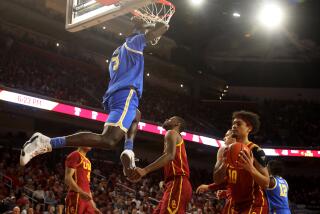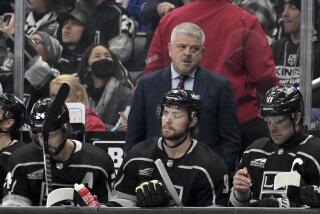COMMENTARY : McNall Handled Trade Poorly
- Share via
It was a bad weekend at Bernie’s.
Actually, a bad week.
Bernie Nicholls’ team went into a slump, his owner went into a rage and Nicholls went into surgery.
Then came the ultimate blow. He went into Pittsburgh for the All-Star game Saturday as a King and left a New York Ranger.
Nicholls is both bitter and perplexed over the deal that sent him to New York for right wings Tomas Sandstrom and Tony Granato.
Should he be?
The wisdom of the trade from the Kings’ standpoint probably can’t be assessed until season’s end. General Manager Rogie Vachon says he needs people with speed and a talent for backchecking to shore up a weak defense, which leaves the impression that Nicholls, who had a 70-goal, 150-point season in 1988-89, could not or would not play an all-around game.
Owner Bruce McNall says he wanted guys with “guts and fire,” which doesn’t say a lot for his perception of Nicholls in that department.
So, there certainly is an argument for making the trade.
But there is no excuse for the way the trade was made.
It is never easy to tell someone you have not only removed him from your organization, but also from his family and the city in which he lives.
Normally, the traded athlete faces only media from the city he is leaving and the city to which he is going.
But Nicholls was forced to spend a day among 200 reporters from two countries at the All-Star game, insisting he was still in the dark about a trade many of them were convinced had already been made.
And when he was finally told by McNall, a personal friend, it was in a public area, in front of many reporters.
There had to be a better way.
The trade rumors had already made a nervous wreck of Nicholls by Thursday. McNall, who plays golf with Nicholls and owns race horses with him, met with the King center before a game against the Detroit Red Wings and told him not to worry, that the Ranger offer, as it stood, was not good enough.
Friday, Nicholls had minor bladder surgery. He was scheduled to take a late-night flight to Pittsburgh to appear in Saturday’s All-Star skills contest.
Should he at least have been warned that the trade was a real possibility, that he might be subjected to a day of denying something that, in reality, was true?
King management insists no deal had been set and there was nothing definite to tell Nicholls.
But in Pittsburgh, word had already leaked that not only was the deal done, a news conference had been arranged for Saturday night.
By Saturday afternoon, Nicholls was the main attraction in a media circus. He seemed to be the only person who didn’t know he had been traded.
Whenever he was asked, his answer was the same: If there had been a deal, McNall would have told him.
When McNall finally did meet with Nicholls, it was in a tunnel under the Civic Arena seats, within sight of a dozen reporters who had been passing by.
See Bernie traded. See Bernie react.
Surely a private room could have been found.
Even then, McNall told Nicholls nothing was definite.
As a matter of fact, the news conference, originally scheduled for 8 p.m., had to be moved to 8:45 because Nicholls still hadn’t been officially informed.
None of this is to imply that McNall is cruel. Just the opposite. He is perhaps too nice.
He takes no delight in trading people, particularly a close friend. Maybe he just couldn’t bring himself to tell Nicholls.
Branch Rickey of the Brooklyn Dodgers once warned his peers in management, never fall in love with an athlete.
It is a lesson others have had to learn. When Jerry Buss bought the Lakers, he hung around with his players a lot more than he does now.
It’s not the first time McNall has been criticized for being too close to his players.
Dean Kennedy, a former King defenseman now with the Buffalo Sabres, finds fault with McNall’s policy of taking several players on his private plane after a road game while the rest are left to go by commercial jet the next day.
“When you treat six players special,” Kennedy said, “that leaves the other 14 wondering.”
Replied McNall: “He might be correct if his facts were accurate. If I just took some selected players all the time, it would be a terrible idea--no question about it. If you’re not careful, it could be perceived that way.
“But I feel, if we have an asset (the plane), we should try to utilize it if a player is injured or can get extra rest. But whatever group goes one time, we’ll take others the next time. Every player will have an opportunity to go before the season is over.”
That’s not to say a Wayne Gretzky might not get on the plane more than others.
“Gretzky is unique,” McNall said. “He has a lot of obligations. But he goes out of his way not to appear to be getting favored treatment.”
Gretzky, who also goes out of his way to avoid controversy, didn’t do so in Kennedy’s case.
“He ought to be in first place more than three days in eight years before he takes a shot at another team,” Gretzky said of Kennedy. “He (McNall) never treats anybody anything less than first-class. It’s not right. He (Kennedy) shouldn’t be talking about a guy who bends over backward for his players.”
Might the Nicholls experience, though, cause McNall to back off a little from his players?
“I can’t change my personality and be more aloof,” McNall said.
Once the Nicholls trade started rolling, it was tough to stop.
The Rangers liked the idea of completing it in the national spotlight, since the player they were getting was there, while the players they were trading were not.
If the Kings had tried to delay it, word still would have leaked.
But given the circumstances, somebody should have taken Nicholls aside the day before and told him where he stood.
In the unlikely case the trade had fallen through, he would have been hurt.
But not as hurt as he is now.
More to Read
Go beyond the scoreboard
Get the latest on L.A.'s teams in the daily Sports Report newsletter.
You may occasionally receive promotional content from the Los Angeles Times.






